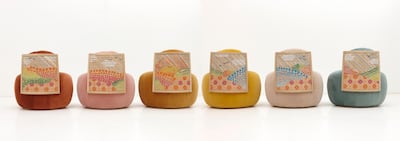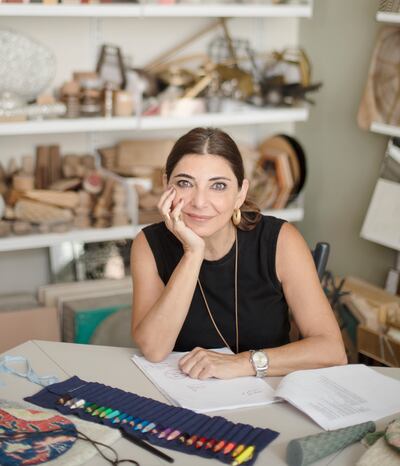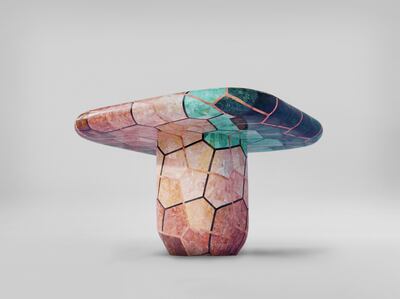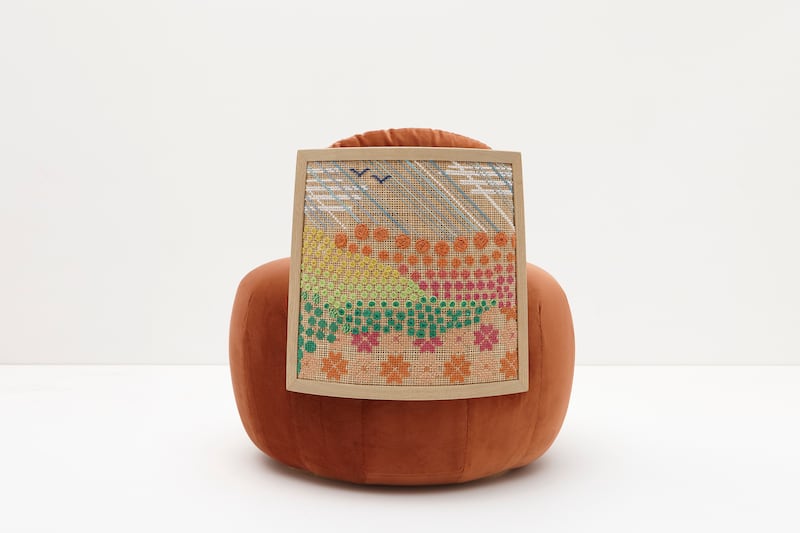Renowned for revitalising traditional Levantine craft, Lebanese designer Nada Debs’s latest furniture series, Stitched Horizons, once again puts artisanal work at the forefront, coupled with her signature minimalism.
In collaboration with 15 Palestinian craftswomen from Lebanon’s Ain Al Hilweh refugee camp, Debs has created six new versions of her popular Pebble Chair, with woven cane backs that are adorned with colourful landscapes at sunset, embroidered by the women.
Under Paris’s Galerie BSL, the series is on show at the fourth Menart Fair in Paris, an annual showcase dedicated to art and design from the Mena region. This year's event is running from September 15 to 17 at Palais d’Iena, a historic 20th-century building and the headquarters of the Economic, Social and Environmental Council (CESE).

“The idea was to work with marginal communities; in this case a craft community in the camps of Ain Al Hilweh,” Debs – who was awarded the Prix du Design by the Institut du Monde Arabe just last week – tells The National. “They’re Palestinian women who usually do cross-stitch and embroidery on fabric, but we wanted to challenge them to do the embroidery on woven cane.
“I wanted to create a series that when the chairs are placed next to each other, it flows together as an image of a sunset,” she adds. “We had the designs in mind and we gave them a sketch, but of course in the end, the choice of colours and the techniques, was up to them.”
Stitched Horizons follows on from a similar series Debs created for Art Abu Dhabi in 2021 called On Belonging, working with Palestinian craftswomen in partnership with 81 Designs Studio, to create segments from Palestinian artist Nabil Anani’s painting In Pursuit Of Happiness, across seven Pebble Chairs. This time, Debs wanted to create something more “colourful and playful” that many people could connect with.
Debs started working with the women in 2022 and over the course of three months, put together the series. The simple yet stunning image of a sunset over flowering fields, rivers and green hills, on the back of different pastel-hued velvet chairs, is the result.

However, the project did come with some challenges as the women were only used to working on fabric and with traditional stitching techniques. They had to learn new ideas, such as 3D-knotting stitches, gradient colouring effects and layering different stitches on top of each other to create interesting patterns and textures.
“These women were working with cross-stitch patterns their whole life, but when we introduced working with woven cane, we wanted to challenge them not only to do cross stitch, but to really come up with different embroidery techniques,” she adds.
“There were definitely challenges – working with a very hard material like cane is difficult, because you have to actually stitch up and down separately, not in one go like you can in fabric.

“The pieces also come in big frames, so that means they have to manoeuvre around this big wooden frame and need the space to do it – it’s not something you can do sat down on a couch,” she says.
“They had to practice many times before figuring out how to use the material, experimenting with different techniques. We also invited them to our studio so that they can actually practice with us, to make sure it was how we envisioned it.”
Debs hopes to continue designing new Pebble Chair series with different landscapes in the future, possibly depicting mountain ranges inspired by real scenery rather than imagined terrains.
Also showing at Menart is Debs’s Gandhara Carapace Table, created in collaboration with Pakistan’s Studio Lel. The amazonite, onyx and marble marquetry table is inspired by Debs’s first experience visiting Peshawar, the oldest city in Pakistan and one of the oldest cities in South Asia.
Recreating her signature Carapace Table, this version is “inspired by the colourful city of Peshawar which features bright colours, intricate patterns and a variety of architectural features,” and mosaics together gleaming blue, pink, russet and beige stones in a geometric pattern.






